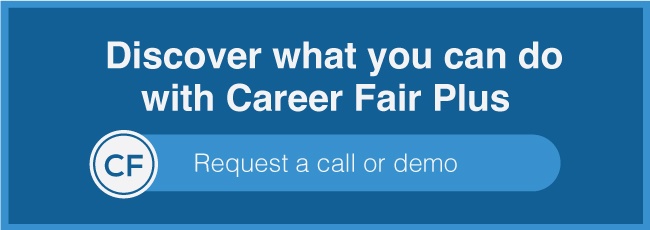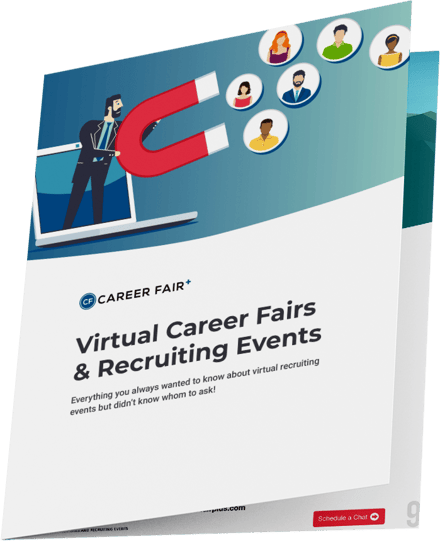Planning a career fair is challenging. Questions are inevitable whether this is your first event or you’ve organized the annual program for years. And asking questions is wise since the answers might increase your efficiency, enhance the career fair, or save money.
Our Career Fair Plus (CF+) team asks (to learn from our customers) and answers (to support our customers) countless questions year-round. Here are the ten we hear most often and the responses to guide you and your team through the career fair planning process.
1) How far ahead should we start planning our job fair?
2) What kind of supplies do I need?
3) What expenses do I budget for?
4) How do I market my career fair?
5) Should I host a large or small career fair?
6) When do I invite the employers and recruiters?
7) What should I consider about choosing a venue?
8) What material do I hand out at the job fair?
9) What do I do on the day of the fair?
10) What happens after the fair?
1.) How far ahead should we start planning our job fair?
Experience tells us five to six months lead time is the sweet spot, especially to give participants sufficient advance notice. The sooner recruiters and job seekers know your event date (and time), the more likely they can attend. Conversely, you risk poor attendance due to scheduling conflicts or budget restrictions if you invite people to register too late.
The best planning period also depends on the type of event. For example, organizing a hybrid program might take more time than planning either an in-person career fair or a virtual event.
2.) What kind of supplies do I need?
Excluding promotional materials, your event-day supply list is based on the type of career fair you’re hosting. For example, on-site events might require booth furnishings, directional signs, easels to display the signs, branded giveaway items, name tags, and snacks.
Online programs, however, need a virtual hosting platform (hint: CF+!) where job seekers connect with recruiters.
3.) What expenses do I budget for?
Your budget is a reflection of the type of career fair you’re hosting. On-site events generate different expenses than virtual fairs, and hybrid programs have costs associated with both formats.
In-person program budgets usually include venue rental, which might or might not factor in the cost of tables, chairs, and trash cans for each employer’s booth. Do you need to rent audio-visual equipment or pay to run extension cords for electrical access? Will you provide snacks or a meal for employer representatives and your staff? Finally, if your event isn’t local, be sure to budget travel costs (e.g., transportation, lodging, parking, etc.).
Virtual job fairs save money on these expenses but could add costs such as IT support or service fees for a hosting platform.
And you’ll need promotional material for either format, which could add graphic design and/or printing fees to the budget.
4.) How do I market my career fair?
Similar to our first two answers, it depends. The type of event, the best ways to connect with your target attendees, and even institutional marketing guidelines can affect your approach. Here are a few general but useful tips:
- Partner with an event platform company (hint: CF+!) that offers a mobile app so you can send push notifications and reminders
- And be sure to create engaging, audience-specific social media posts for job seekers and recruiters.
- Launch a well-branded webpage prominently displaying the career fair date, location, times, and who to contact for more information.
- Share an alphabetized list of registered employers, including company logos if possible.
- Invite employers and job seekers to register on the page (or a linked form)
- Offer answers to FAQs for recruiters and candidates.
- Word of mouth. If it feels old-fashioned, call it word of email, but either way, just tell people! Ask university colleagues, academic advisors, and department heads to share with their students. Employers might or might not tell industry associates if they’re competing for the same applicants, but maybe they’ll help promote the event to non-competitors.
- If this is a college-based event, printed fliers around your campus still attract student attention.
5.) Should I host a large or small career fair?
We see a constant back and forth between boutique and general fairs as event organizers test the best ways to optimize the employer and candidate experience. Of course, a high number of attendees typically suggests larger, broader job fairs. Conversely, a smaller pool of job seekers could mean hosting more focused events.
Also, consider your in-house resources: hosting a job fair for 100 employers and 1000 candidates might stretch a planning team of five or six too thin. However, those same individuals could produce a career fair for a single major or industry.
Past events can inform this decision, too. Whatever worked well before might be worth repeating, whereas you might need to adjust the scope of less successful programs.
Finally, set clear goals as part of your decision-making process. A recruiting event targeting summer internships or one job category can likely be smaller in size than a career fair for multiple industries or open positions.
6.) When do I invite the employers and recruiters?
Four to six months in advance is a realistic time frame for a multi-employer event, especially since the people you’re inviting are very busy during Fall and Spring recruiting seasons. However, if your planning or budgeting cycles don’t allow long lead times, aim for a minimum of two months’ notice. You can also let your employers and recruiters know you’re anticipating a late February or mid-March event and ask them to watch for their invitation. At least get your career fair on their radar, even before you have a confirmed date and time.
7.) What should I consider about choosing a venue?
When you’re choosing a venue, balance the overall mix of location, maximum occupancy allowed by law, and cost. Since you cannot change the maximum occupancy, rule out any potential campus or community sites that limit your attendees below your expected attendance. Participating employers might also appreciate access to quiet or private areas for interviews.
Logistically, consider if the venue has an unloading area for employers bringing exhibit booths. Is there sufficient parking for staff, candidates, and employers? Access to public transportation might be beneficial as well.
8.) What material do I hand out at the job fair?
Critical event-day information starts with a list of participating companies & their location on the venue map and an event schedule including workshops or employer presentations. It’s also essential to introduce your staff and share how attendees can find them if they need assistance throughout the day. Finally, include a career fair evaluation to capture valuable attendee feedback.
If you choose a hosting partner with a mobile app in which you can digitize and update program materials in real-time, you don’t have to spend time or money printing handouts.
9.) What do I do on the day of the fair?
Because the specific tasks can vary depending on the venue, number of attendees, and even the time of the career fair, here’s some general planning advice:
- Assign staff to oversee venue set up (which might happen the day before, too.)
- Position staff members in strategic positions to welcome employers for set up (and later job seekers) and direct them to their booth.
- Prepare and staff the student registration table.
- Select team members to circulate throughout the venue, visiting with employers and answering questions as needed.
- Manually collect the program evaluations, or remind participants to complete an online form in the career fair app or on your website.
10.) What happens after the fair?
Say thank you!
Thank your staff while you’re together on-site and send thank notes to your participating employers. Thank your job seekers for showing up and engaging. And take advantage of this opportunity to remind them to complete your career fair day evaluation.
If you partnered with CF+ you’ll have analytical reports to review and evaluate, too. Plus, you might decide to share this data when you promote your next recruiting event.
Hosting an on-site career fair can be a daunting task, requiring answers to far more than ten questions. Still, we hope this mini-Q&A builds confidence and assures you that a successful in-person recruiting event is doable, especially with the right hosting partner. Career Fair Plus is uniquely positioned to help you build in-person, virtual, and hybrid career fairs.
Talk with a CF+ team member before your next recruiting event planning meeting. We’re delightful people, always ready with practical tips and dependable solutions!

